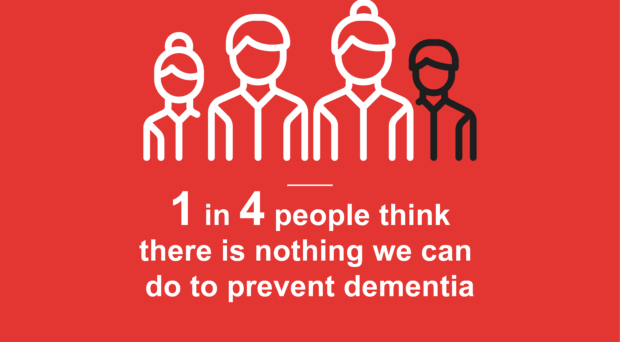
“My mother has Alzheimer’s and so do her two sisters, but I had never imagined that this would happen to me. And then suddenly, I started to forget things, to forget my friends’ names, and the things I had to do. I also misplaced objects that I would find days later. I felt frustrated, got mad at myself many times, and wondered what was going wrong with me. At first, my husband Eduardo was angry too. He also could not understand what was going on.”
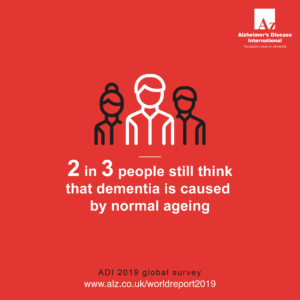
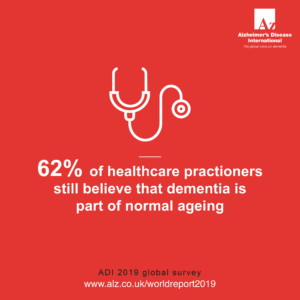
This quote is from a lady called Andrea from Brazil. Her story is, unfortunately, one that is shared by millions of people around the world. I am happy to report that Andrea’s situation did improve – once she received a diagnosis, she and those around her began to cope better and understand her symptoms. Crucially, she became more self-accepting. However, across the world many people do not have adequate access to healthcare, and therefore do not receive a diagnosis of Alzheimer’s or other brain diseases leading to dementia.
Andrea’s story appears in our World Alzheimer Report 2019. The report aims to understand the stigma still surrounding dementia in every country, and by extension to measure how much impact campaigns such as World Alzheimer’s Month are having on people’s attitudes around dementia.
Why focus on stigma?
ADI has been running its global campaign since 2012 and many national-level campaigns take place across the world. Since 2017, all governments have an obligation to develop functioning awareness campaigns on dementia. This was after the 194 WHO Member States unanimously adopted the Global Plan of Action on the Public Health Response to Dementia 2017-2025 (Global plan hereafter) in May 2017.
An entire Action Area of the Global plan is dedicated to ‘Dementia awareness and friendliness’, and awareness is mentioned 26 times in the document; stigma appears 9 times. This is no accident. So, we know it is important, but how effective have awareness campaigns been at tackling stigma?
World Alzheimer’s Month 2019
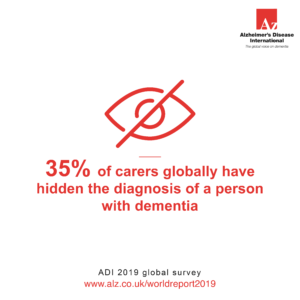 The theme of this year’s campaign is ‘Let’s talk about dementia’. We wanted to highlight the issues faced by the global dementia community. Stigma is a major barrier to people accessing support. Stigma manifests for many reasons. It can be similar to that around other mental health issues, be part of age-related stigma, be exacerbated by a lack of available medical treatments and even put down to factors like witchcraft. Dementia-related stigma leads to all kinds of unfair treatment, in domestic, community and even healthcare settings and can be a major barrier to acceptance, adaptation and planning. Talking helps to normalize the language and to take away the fear, encouraging people to seek out crucial information, help, advice and support.
The theme of this year’s campaign is ‘Let’s talk about dementia’. We wanted to highlight the issues faced by the global dementia community. Stigma is a major barrier to people accessing support. Stigma manifests for many reasons. It can be similar to that around other mental health issues, be part of age-related stigma, be exacerbated by a lack of available medical treatments and even put down to factors like witchcraft. Dementia-related stigma leads to all kinds of unfair treatment, in domestic, community and even healthcare settings and can be a major barrier to acceptance, adaptation and planning. Talking helps to normalize the language and to take away the fear, encouraging people to seek out crucial information, help, advice and support.
The survey, which saw nearly 70,000 responses from 155 countries, is the largest ever undertaken on the subject.
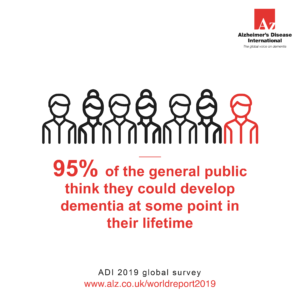
Survey findings
The figures included throughout this blog highlight a few key headlines from the survey, but I would strongly encourage you to read the full report.
These findings are powerful in themselves, but they need to stimulate action. Governments need to finally acknowledge that we have a crisis on our hands. As well as providing better diagnostic and post-diagnostic support and striving for a disease-modifying treatment, there must be a focus on preventive and promotive services. Universal health coverage cannot be achieved without addressing the risk factors that unite so many chronic conditions.
The evidence base for risk reduction is expanding. The WHO recently launched new Guidelines on risk reduction of cognitive decline and dementia, which show that reducing modifiable risk factors could prevent 20-30% of dementia cases. Simultaneously, political support for risk reduction is slowly building. The WHO have expanded their framework for non-communicable disease (NCD) prevention and control to include dementia under mental and neurological conditions. Action Area 3 of the Global plan requires that specific risk reduction targets be met. All governments therefore need to invest in targeted public health campaigns to affect individual and population behavior change that will save money further along the life-course. It is unacceptable that 75% of people from our survey are unaware that we can do something to reduce the risk of developing dementia.
Alzheimer’s Research & Th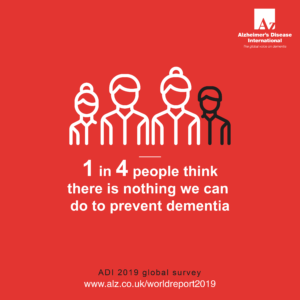 erapy is spearheading publication on risk reduction. At the bottom of this page, you can find examples of the work being done worldwide to identify and diminish risk factors for dementia.
erapy is spearheading publication on risk reduction. At the bottom of this page, you can find examples of the work being done worldwide to identify and diminish risk factors for dementia.
Today, on World Alzheimer’s Day, I urge you to read our report and to share it far and wide. We need to stimulate conversations about dementia at all levels. ADI calls on all Governments to develop and fund national dementia plans – only through this will we truly begin to understand dementia and address the stigma that surrounds it.
“Shunned by hundreds in my home town. People would sooner have stage 4 breast cancer than my diagnosis. [They] couldn’t look me in the eye.”
I leave you with a quote from one of the survey respondents living with dementia: “Shunned by hundreds in my home town. People would sooner have stage 4 breast cancer than my diagnosis. [They] couldn’t look me in the eye.”
We must strive for a world where individuals with dementia can access support and services without fear of stigmatization; in the same way that physical or visible ailments are treated. This is our year to end the stigma.
- World Alzheimer’s Month: Let’s talk about dementia to end the stigma - 20th September 2019
Comments